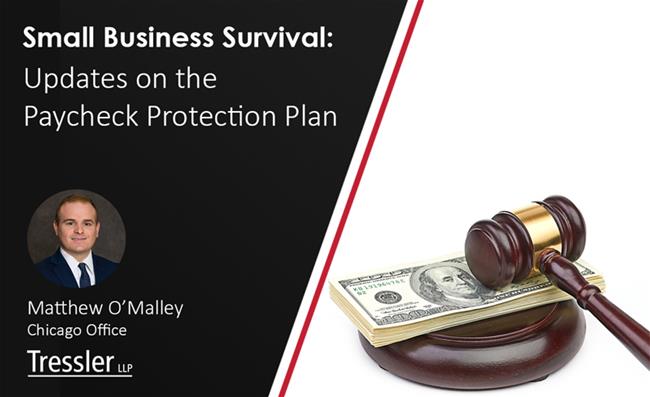
Congress recently passed a relief bill known as the Coronavirus Aid, Relief, and Economic Security Act, or simply, the “CARES Act”. The CARES Act has several provisions that may help small businesses. The bill aims to assist Americans over for the next four to six weeks given COVID-19's widespread disruption of the economy. While far from exclusive, the $2.2 trillion Act included two main categories of economic stimulus: tax deferral and loans.
The CARES Act created the Paycheck Protection Plan (“PPP”) and the initial round of funding of loans has depleted. Small business applications have proven to be popular but confusing. To provide further relief, Congress has recently provided an additional $310 billion in funds that will be available this week. It is expected that this round of funding will go quickly, so time is of the essence to submit an application on behalf of your small business.
OVERVIEW OF THE PPP
- Who can apply?
- Any business that has 500 or fewer employees, and
- Open on or before February 15, 2020
- What is the loan for?
- Expenses related to salaries, wages, health insurance premiums, payment of interest on business mortgage obligations, rent, and utilities, among other charges for your business.
- Other details:
- It is forgivable, in whole, or in part, WITH caveats.
- The Small Business Administration is supposed to offer additional guidance on these rules.
- The loan must be spent during an eight-week time period for it to be forgiven.
- 75% must be used on payroll costs (salary, wages, health insurance, retirement contributions).
- There can be no reduction in compensation of any employee making less than $100K by any more than 25% otherwise you will lose some of your loan forgiveness.
- The cap on the loans is $10 million and a business can apply for 2.5 times its payroll.The time period to determine payroll expenses can be 2019’s expenses or 12 months prior to your application.
- If your business has not been around for that long, then all your prior months’ expenses need to be included.
- If your PPP loan is not forgiven, the term is 1% interest and it must be paid back within 2 years.
This is far from an exhaustive list of the PPP or its details. The loan program is very nuanced. Given its demand, we expect that only accurate and timely applications will be accepted. Tressler LLP can assist your small business during this difficult time and we are available to help you develop a plan or policy. I am available to help evaluate the PPP, the CARES ACT or otherwise develop client-based goals and implement solutions for your business (even on a remote basis).
Feel free to contact me for a complimentary consultation at momalley@tresslerllp.com or by phone at (312) 627-4052.
About Matthew J. O’Malley
Matt is a member of Tressler's Litigation Practice Group and advises his clients on litigation strategies, skillfully representing them through all phases of litigation. Matt has a track record of success in both bench and jury trials. He focuses on the client’s resolution goals, whether that is achieved through trial, settlement conference, mediation or arbitration. Matt serves his clients in a variety of complex litigated and non-litigated matters, including actions for breach of contract, breach of fiduciary duty, indemnity and contribution, professional malpractice, personal injury, general corporate, LGBT issues, employment discrimination and civil rights violations.
About Tressler LLP
Tressler LLP is a national law firm headquartered in Chicago, with eight offices located in five states - California, Illinois, New Jersey, New York and Pennsylvania. Tressler attorneys are experienced counselors and advocates who appear in state and federal courts, and in governmental proceedings, throughout the United States. Many Tressler attorneys devote their practice to the representation of the insurance industry in coverage analysis and resolution, litigation, underwriting consultation, product development, claims management and reinsurance. Tressler attorneys also represent clients in commercial litigation, employment, local government law, corporate transactions and intellectual property law. Contact us to learn more. Contact us to learn more.

